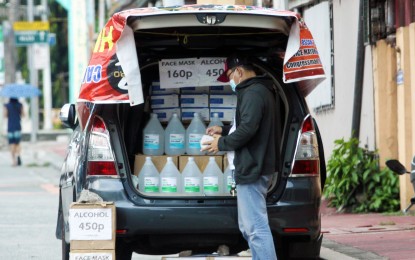
STRICTER PERSONAL HYGIENE. A man sells bottles of alcohol from the trunk of his car. The ongoing Covid-19 pandemic has prompted many Filipinos to be “cleaner than clean” to avoid contracting the disease. (PNA file photo by Joey Razon)
MANILA – The government has been constantly reminding Filipinos to practice proper personal hygiene, apart from wearing protective gear and observing physical distancing, to avoid catching the coronavirus disease 2019 (Covid-19).
As the pandemic lingers, many Filipinos have taken the advice to heart, going the extra mile to make sure they are safe from the unseen enemy.
Nowadays, no one seems to be at ease without carrying his or her personal isopropyl alcohol sprayer, mini-disinfectant kit, and sanitizer when leaving home.
Businesswoman Charlene Manuel, a resident of San Carlos, Pangasinan, said she has at least four mini-alcohol sprayers and some hand sanitizers inside her car.
This is aside from the mandatory wearing of face masks and face shields, Manuel said in an interview with the Philippine News Agency (PNA) on Thursday.
She said she sprays herself with these disinfectants before leaving her car to run errands and before re-entering.
"And tuwing may nahahawakan or nasasagi sa labas, nag-spray ako agad (And every time I hold or touch something outside, I would spray myself immediately)," Manuel added.
She said she immediately takes a shower as soon as she gets home as an added safety measure.
Manuel said she has to take all these precautionary measures because her parents are senior citizens, who are vulnerable to Covid-19.
Social worker Chad Kevin Dizon of Ermita, Manila said he never leaves home without alcohol and other disinfectants.
"At kapag nasa labas ako, physical distancing talaga (And when I am outside, I practice social distancing)," Dizon said.
He said he refrains from eating or dining outside unless he is certain the establishment has a facility where he could wash his hands with soap and alcohol and observe physical distancing.
"And kada uwi sa bahay, naliligo ako agad to disinfect (And once I get home, I would take a bath immediately to disinfect myself)," Dizon said, adding that he would also separate his work clothes from the other laundry as another precautionary measure.
New mom Kaye Pangilinan of Navotas City said she does not scrimp when it comes to buying alcohol and other disinfectants just to keep her family safe.
"'Yung alcohol sterillium ginagamit namin, hospital grade. Kahit mahal, okay lang kasi iniisip namin safety namin (What we are using is hospital-grade alcohol, called alcohol sterillium. It may be a bit expensive but we are thinking of our safety)," Pangilinan said, noting that she spent PHP1,200 for a liter of alcohol sterillium.
"Tapos every time na may nahawakan kami kung saan, spray agad sa kamay (And every time, we touch something outside, we immediately spray our hands with alcohol)," she said.
This is aside from the ionizer, face masks, and other protective equipment she brings around to safeguard her family.
"Tapos sa bulsa ko, lagi ako may dala na (sabon), parang pag-wash ng kamay (I always keep a bar of soap in my pocket so I can wash my hands anytime)," Kaye said.
Societal behavior explained
Citing the theory of structural functionalism, former sociology professor at the Pamantasan ng Lungsod ng Maynila, Polytechnic University of the Philippines, and Bulacan State University, Dr. Catherine Laririt said hygiene practices are only a portion of the bigger picture of the society's aim to curb the disease.
This theory defines society as a structure with interrelated parts designed to foster stability and solidarity.
"If we follow health protocols implemented by the government and the World Health Organization, we can be considered as manifest functions," Laririt said in an interview via Messenger.
Manifest functions are defined as the outcome of social processes that are sought or anticipated.
However, people's non-compliance can be considered as latent functions or unintended consequences of social processes, which can lead to undesirable outcomes called social dysfunction.
"With dysfunction, people contribute a lot to the spread of the virus and don't help the government. It depends on the people for them to survive the pandemic, so it is really important to observe these protocols," she said.
Laririt said people panic-buying and hoarding disinfectants and other essentials shows that the rules of economics apply even during a pandemic.
"Capitalism. For those who have money can purchase voluminous alcohol, sanitizers, face masks/shields, PPE (personal protective equipment), and resell (them) at a higher price," she added.
While the health crisis impairs the economy, it also opens an opportunity for people to earn, if not make a profit, during these trying times, Laririt said.
"The law of supply and demand is very visible not only to businessmen nationwide but even to small entrepreneurs who want to survive financially," she said.
Laririt, however, noted that while the pandemic has reinforced personal hygiene among Filipinos, this usually applies only to the elite and the middle class.
"With the masses, we have to consider their real scenarios of small spaces in their house, lack of water supply to use, they need to include (in) their budget the expenses in buying face mask, face shield, alcohol, etc. and other products needed for personal hygiene," she said.
Just like any other crisis situation, Laririt said the pandemic shows the big difference between social classes.
"The rich and working class, as long as they have their work and proper salaries, they can purchase the products they need. But the lower class or the non-working, definitely, they will rely on support from local government units (LGUs) and the national government to survive this pandemic," she said.
The government has initiated the "Mask Para sa Masa" program, aiming to provide free face masks to the poor.
LGUs have also been distributing hygiene kits and other essentials to the poor and other vulnerable sectors as part of efforts to curb the spread of Covid-19. (PNA)
